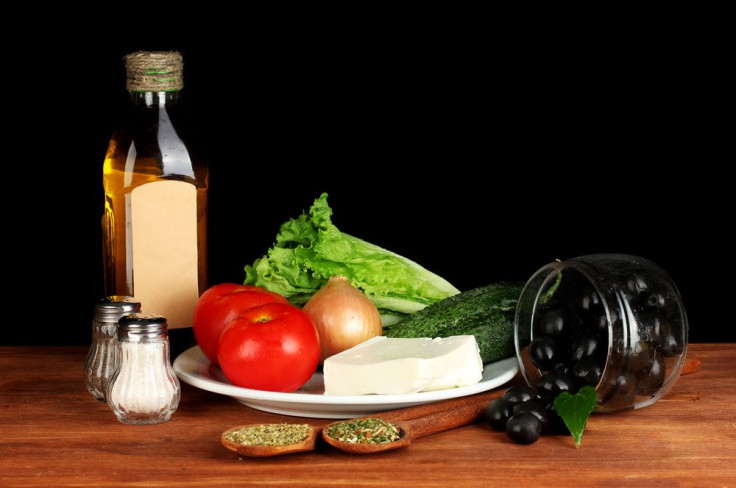Mediterranean Diet With Nuts, Olive Oil Cuts Risk Of Peripheral Artery Disease

A Mediterranean diet rich in extra-virgin olive oil and nuts may lower your risk of developing peripheral artery disease (PAD), a condition that restricts blood flow and causes intermittent leg pain, a new study from the University of Navarra in Spain has found.
Can good eating habits help your blood run more smoothly? According to lead author Dr. Miguel Ruiz-Canela and colleagues, the much-publicized Mediterranean diet was associated with a significantly lower risk of PAD in a trial involving 7,477 participants with an average age of 67 years. "To our knowledge, this is the first randomized primary prevention trial to suggest an association between a dietary intervention and [reduction in] PAD,” the authors wrote. “These results are consistent with previous observational studies and relevant from a public health perspective."
The study, which is published in the Journal of the American Medical Association, followed men aged 55 to 80 and women aged 60 to 80 between 2003 and 2010. Participants followed one of three meal plans: a Mediterranean diet supplemented with extra-virgin olive oil; a Mediterranean diet supplemented with nuts; and a low-fat diet with regular counseling. Participants who followed the third plan served as the trial’s control group.
At a median follow-up of 4.8 years, 89 participants had developed clinical PAD. Using these results, the team was able to determine that both variations of the Mediterranean diet were associated with a significantly lower incidence of the disease.
Mediterranean Diet and Your Health
The study adds to the ever-growing body of evidence that the Mediterranean diet is the way to go for pretty much everyone with an elevated risk of cardiovascular complications and age-related disease. Previous scientific inquiry has shown how the diet can fight obesity, lengthen lifespan, and ward off dementia better than many pharmaceutical drugs. Some also claim that the meal plan can help prevent adult-onset diabetes.
But why is it that a diet rich in fish and nuts can stave off disease at all? According to Ruiz-Canela, the decreased risk of PAD and other complications may be the result of a wide range of interactions, primarily those targeting inflammation. “There are many reasons to safely assume a strong anti-inflammatory effect of extravirgin olive-oil, as we have also published in previous studies conducted among subgroups of participants in the PREDIMED trial,” he wrote in an email to Medical Daily. “In this context, olecanthal, a naturally occurring anti-inflammatory agent in virgin olive oil, has demonstrated interesting properties.
“In addition, beneficial effects of Mediterranean-type diets on oxidation of bad cholesterol (LDL), blood pressure, insulin sensitivity and clotting properties of blood have been also demonstrated,” he added.
Better Eating, Healthier Veins
Heart disease currently kills about 2,200 Americans every day, making it the nation’s number one cause of death. However, as many public health agencies and expert groups point out, it doesn’t have to be this way. With proper dieting and regular exercise, the population may see a significant decline in stroke, heart attacks, and other killers.
According to the Mayo Clinic, a Mediterranean diet relies on fruit, vegetables, beans, legumes, and nuts as the foundation of every meal. In addition, the diet recommends:
- Eating primarily plant-based foods, such as fruits and vegetables, whole grains, legumes and nuts
- Replacing butter with healthy fats, such as olive oil
- Using herbs and spices instead of salt to flavor foods
- Limiting red meat to no more than a few times a month
- Eating fish and poultry at least twice a week
- Drinking red wine in moderation



























